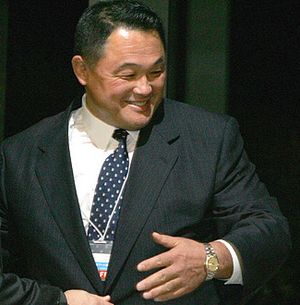Yasuhiro Yamashita facts for kids

Yasuhiro Yamashita in 2005
|
|||||||||||||||||||||||||||||||||||
| Personal information | |||||||||||||||||||||||||||||||||||
|---|---|---|---|---|---|---|---|---|---|---|---|---|---|---|---|---|---|---|---|---|---|---|---|---|---|---|---|---|---|---|---|---|---|---|---|
| Born | 1 June 1957 Yabe, Kumamoto, Japan |
||||||||||||||||||||||||||||||||||
| Died | Error: Need valid death date (first date): year, month, day | ||||||||||||||||||||||||||||||||||
| Occupation | Judoka | ||||||||||||||||||||||||||||||||||
| Sport | |||||||||||||||||||||||||||||||||||
| Country | Japan | ||||||||||||||||||||||||||||||||||
| Sport | Judo | ||||||||||||||||||||||||||||||||||
| Weight class | +95 kg | ||||||||||||||||||||||||||||||||||
| Achievements and titles | |||||||||||||||||||||||||||||||||||
| World finals | 1983) |
||||||||||||||||||||||||||||||||||
| Olympic finals | |||||||||||||||||||||||||||||||||||
|
Medal record
|
|||||||||||||||||||||||||||||||||||
| Updated on 19 June 2023. | |||||||||||||||||||||||||||||||||||
Yasuhiro Yamashita (山下 泰裕, Yamashita Yasuhiro, born 1 June 1957) is a famous Japanese judoka. A judoka is someone who practices judo, a Japanese martial art and sport. Many people think he is the greatest judo athlete ever.
Yamashita had an amazing career. He won five gold medals in big international competitions. He also had an incredible streak of 203 wins in a row! He retired from competitive judo on June 17, 1985. He was never defeated by a non-Japanese wrestler during his entire career. He received the Japanese National Prize of Honor in 1984 for his achievements.
Today, Yamashita works as an instructor and advisor for many groups. These include Tokai University, the International Judo Federation, and the All Japan Judo Federation.
Contents
Yamashita's Judo Journey
Starting Judo and Early Wins
Yasuhiro Yamashita started learning judo when he was in primary school. He was inspired by Kanō Jigorō, who created judo. By the time he was in junior high, he had already earned a black belt.
After high school, Yamashita continued his judo training. He learned from famous judokas like Isao Inokuma, who won a gold medal at the 1964 Summer Olympics. He also trained with Nobuyuki Sato, a gold medalist from the 1967 World Judo Championships.
Yamashita's incredible winning streak began in October 1977. This was during a special match held in the Soviet Union. His streak continued until his very last match in April 1985. In that final match, he won the All-Japan judo championships for the ninth time in a row!
Olympic Dreams and Challenges
Yamashita first qualified for the Olympics in 1976. He was only 19 years old when he won the open category of the All-Japan Judo Championships in 1977. This made him the youngest judoka ever to achieve that.
He won a gold medal at the 1979 World Judo Championships. This helped him secure a spot on the Japanese Olympic team. However, Japan decided to boycott the 1980 Summer Olympics in protest. This meant Yamashita could not compete, even though he was ready.
In 1980, during the All-Japan championships, Yamashita faced Sumio Endo. Endo used a move called Kani Basami. This move caused Yamashita to break a bone in his leg. Even though Yamashita was hurt, the match was called a draw. Because of this serious injury, Kani Basami was later banned from international competitions.
Olympic Gold and Retirement
After the 1980 boycott, Yamashita continued to dominate. He won three more gold medals at the World Championships. He then qualified for the 1984 Summer Olympics in Los Angeles. He was the only Japanese judo athlete from the 1980 boycott who also made it to the 1984 Games.
During his first Olympic match in 1984, Yamashita injured his right calf muscle. This was a big problem because he used his right leg for many of his throws. Despite the injury, he kept fighting. He won his preliminary match and then his semi-final match, even though he was limping.
In the final match, Yamashita faced Mohamed Ali Rashwan from Egypt. Even with his injured leg, Yamashita won the gold medal! Rashwan showed amazing sportsmanship during the match. He chose not to attack Yamashita's injured leg. For this act of fair play, Rashwan received a special award.
Yamashita remained undefeated in both Japanese and international competitions. He did have several draws with Hitoshi Saito, who won two Olympic gold medals. Yamashita faced Saito in the All-Japan Judo Championships final for three years in a row (1983-1985) and won each time. After many injuries throughout his career, Yamashita decided to retire from competitive judo on June 17, 1985. He was only 28 years old.
Life After Competition
After retiring from competitive judo, Yamashita became an instructor. In September 2003, he became the Director of Education for the International Judo Federation.
He was the head coach for the Japanese judo team at the 2000 Summer Olympics. He also worked with Russian President Vladimir Putin, who also has a black belt in judo. They even put together a judo instruction video.
Yamashita is currently the chairman of the Japanese Olympic Committee. On January 10, 2020, he was also chosen to be a member of the International Olympic Committee. In 2022, he was promoted to the 9th dan rank in judo, which is a very high honor.
Yamashita's Judo Style
During his competitive years, Yamashita was a strong and powerful judoka. He was about 5 feet 11 inches tall (180 cm) and weighed over 280 pounds (127 kg).
He used a left-handed stance, which means he preferred to grip his opponent with his left hand forward. His best moves were the Osotogari (major outer reap) and the Ouchi Gari (major inner reap). He used Ouchi Gari very often and found it very effective.
Later in his career, he also found the Uchi mata (inner thigh throw) to be very successful against opponents from other countries. Yamashita was also excellent at ground fighting. Many of his wins came from holding or choking his opponents on the mat. His skill in both standing throws and ground techniques helped him stay undefeated for over nine years.
See also
 In Spanish: Yasuhiro Yamashita para niños
In Spanish: Yasuhiro Yamashita para niños

